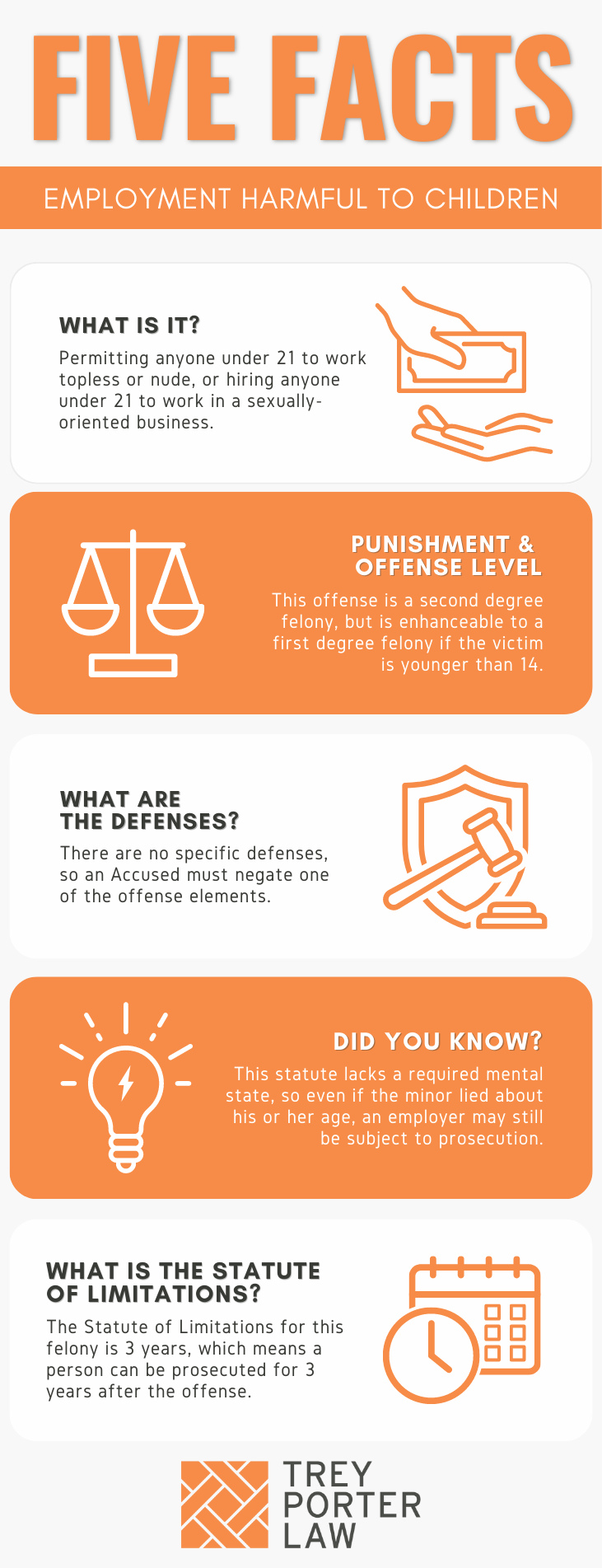WHAT IS EMPLOYMENT HARMFUL TO CHILDREN IN TEXAS?
The Texas law against employment harmful to children punishes employers who allow anyone under 21 years old to work topless or nude. The law further prohibits hiring anyone under 21 to work at a sexually oriented business.
- What is a sexually oriented business or commercial activity? Pursuant to Texas law, a sexually oriented commercial activity is a commercial enterprise offering a service intended to provide sexual stimulation or sexual gratification to the customer. The term includes massage establishments, nude studios, modeling studios, and love parlors.
WHAT IS THE EMPLOYMENT HARMFUL TO CHILDREN LAW IN TEXAS?
Tex. Penal Code § 43.251. EMPLOYMENT HARMFUL TO CHILDREN.
(b) A person commits an offense if the person employs, authorizes, or induces a child to work:
(1) in a sexually oriented commercial activity; or
(2) in any place of business permitting, requesting, or requiring a child to work nude or topless.
(c) An offense under this section is a felony of the second degree, except that the offense is a felony of the first degree if the victim is younger than 14 years of age at the time the offense is committed, regardless of whether the actor knows the age of the victim at the time of the offense.
(d) Conduct under this section constitutes an offense regardless of whether the actor knows the age of the victim at the time of the offense.
WHAT IS THE PENALTY CLASS FOR EMPLOYMENT HARMFUL TO CHILDREN IN TEXAS?
Employment harmful to children is a second degree felony, punishable by two to 20 years in prison. It becomes a first degree felony, punishable by five to 99 years or life in prison, if the minor employed is younger than 14.
WHAT IS THE PUNISHMENT RANGE FOR EMPLOYMENT HARMFUL TO CHILDREN IN TEXAS?
Employers charged with employment harmful to children as a second degree felony face two to 20 years in prison, and a maximum fine of $10,000. If charged as a first degree felony, it carries five to 99 years in prison, and up to a $10,000 fine.
WHAT ARE THE PENALTIES FOR EMPLOYMENT HARMFUL TO CHILDREN IN TEXAS?
A person charged with employment harmful to children may be eligible for probation after a conviction, or deferred adjudication without a conviction, for a period of up to ten years.
WHAT ARE THE DEFENSES TO EMPLOYMENT HARMFUL TO CHILDREN IN TEXAS?
The statute does not provide for any defenses to employment harmful to children, but an accused may attempt to negate any of the elements the State must prove at trial.
- What if the employer did not know the employee was under 21? The statute explicitly states ignorance of the employee’s age is not a defense. The law puts the onus on the employer to ensure all potential employees of a sexually oriented business are at least 21 years old. The statute also lacks a required mental state, so even if the minor lied about his or her age, an employer may still be subject to prosecution.
WHAT IS THE STATUTE OF LIMITATIONS FOR EMPLOYMENT HARMFUL TO CHILDREN IN TEXAS?
The limitation period for employment harmful to children is three years.
EMPLOYMENT HARMFUL TO CHILDREN IN TEXAS
Employers who induce, authorize, or hire anyone under 21 to work at a sexually oriented business, or to work nude or topless, are subject to prosecution for a felony, regardless of whether the employer knew the minor’s age.
The Texas Legislature raised the minimum legal age from 18 to 21 ostensibly to safeguard communities and children from trafficking and sexual exploitation. According to lawmakers, sexually oriented businesses are a hunting ground for human traffickers, and 21-year-olds are less vulnerable to trafficking.
TEXAS EMPLOYMENT HARMFUL TO CHILDREN COURT CASES
The case law regarding employment harmful to children in Texas arises from recent lawsuits filed by sexually oriented businesses challenging the constitutionality of the law.
- In DC Operating, LLC v. Paxton, two exotic dancers and their employer, an adult entertainment club called Dreams, sought to enjoin enforcement of the law. The First Amendment protects nude dancing as free expression, and the entertainer-audience association. However, a thorough analysis under the First and Fourteenth Amendments led the District Court to conclude the law was constitutional, and non-discriminatory. Plaintiffs appealed to the Fifth Circuit.













